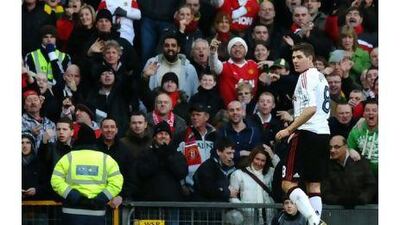It is a strange world where the easy bit is holding Manchester United for an hour at Old Trafford with 10 men. But the hard part starts now for Kenny Dalglish.
Sunday contained the understandable emotion. Now it is time for the practical considerations of his return to the frontline.
After the relaxed nature of life on a cruise liner comes the hectic schedule of English football. Blackpool tomorrow, Everton on Sunday; games he approaches without his two most trusted lieutenants.
In one respect, a visit to Manchester United was the least desirable first fixture. In another, it was a shot to nothing. Expectations are so low that few anticipated anything other than a defeat.
Dalglish's comeback was sufficiently heartening in itself that it obscured the loss to hated rivals for many among the travelling fans.
Indeed, his first influence is on the supporters. Dalglish is idolised in the stands. Using his status to call for unity was an astute move. Grievances about Roy Hodgson should be consigned to the past.
The players should be aware, too, that with a manager who is idolised and owners who are being given the benefit of the doubt, there is no longer a shield for them.
The two likeliest to hang on Dalglish's every word are Steven Gerrard and Jamie Carragher. One is suspended now, the other injured. Footballers have a duty to know and understand the history of their club, to appreciate the importance of the men who have gone before them, to respect anyone with the illustrious achievements and luminous talents of Dalglish. That does not necessarily mean they do.
Gerrard and Carragher can appear anomalies so in the dressing room, if not on the pitch, they have a task to tell those unaware of the Dalglish legend that failing to perform for Hodgson was one thing; letting down "the King" is a more heinous crime altogether.
In his first spell at Anfield, the foreign contingent consisted of Dalglish's fellow Scots.
Whether his aura, or indeed his dry Glaswegian wit, translates for a multinational squad is an issue. After such an extended break from the touchline, it is inevitable questions will be asked if he can still manage.
It is a different world; perhaps a different game. Dalglish is quickly discovering that it is not 1991 any more.
Gerrard was dismissed for the sort of challenge that Graeme Souness might have committed with impunity in his prime; Ryan Babel contrived to generate controversy by posting a doctored picture of Howard Webb, Sunday's referee, in a Manchester United shirt on his Twitter page.
In Dalglish's day, social networking was a game of golf with Alan Hansen.
Yet since letting it be known that he was interested in the job in the summer, Dalglish has had plenty of time to consider what he would do. The first indications were there at Old Trafford; a quicker, more ball-playing defender, in Daniel Agger, was preferred to the lumbering Sotirios Kyrgiakos; Hodgson's former Fulham left-back Paul Konchesky was nowhere to be seen; youth was given a chance, with Martin Kelly starting and Jonjo Shelvey brought off the bench.
Dalglish will never be the most demonstrative individual, but there were signs he is acting quickly and decisively. An improved performance suggests he can still both organise and inspire.
He will need to. Liverpool's lamentable league form accounted for Hodgson. They are on for their lowest league finish in the 49 seasons since they were promoted back to the old Division 1in 1962. Dalglish risks tarnishing his lustrous reputation in his bid to rescue Liverpool. Succeed, however, and his standing will be even higher.
¿¿¿
The notion that the FA Cup is magical would probably be disputed in the north east of England today after all of its representatives exited the competition, two in the biggest shocks of the round.
In both cases, it was startling how swift the turnaround was. Newcastle United had won their previous two league matches, hammering West Ham United 5-0 on Wednesday, before meeting a Stevenage side 15th in League Two and with a mere three home wins in 11 games.
They were deservedly defeated, with Peter Winn's delightful injury-time goal summing up Stevenage's superiority.
Sunderland, meanwhile, are sixth in the top flight, the latest threat to Chelsea's status and enjoying their best season for many a year.
None of that mattered when Notts County won 2-1 at the Stadium of Light.
With Middlesbrough also going out (to League Two Burton Albion), a region that has been starved of silverware will have to wait for another year.
¿¿¿
Sunday's most spectacular scoreline was Chelsea's 7-0 win over Ipswich Town.
It suggested Carlo Ancelotti's team took out their frustrations on the unfortunate Championship strugglers.
While it is only a few months, however, since they were beating Premier League teams by the same margins, it does rather indicate the scale of the mess Roy Keane, the sacked manager, has left at Portman Road.
And while some lower-league teams tend to savour cup ties against the elite, Ipswich may be the exception.
Next up: Arsenal in the Carling Cup semi-finals. Sometimes an obscure exit to less garlanded opposition can seem preferable.


